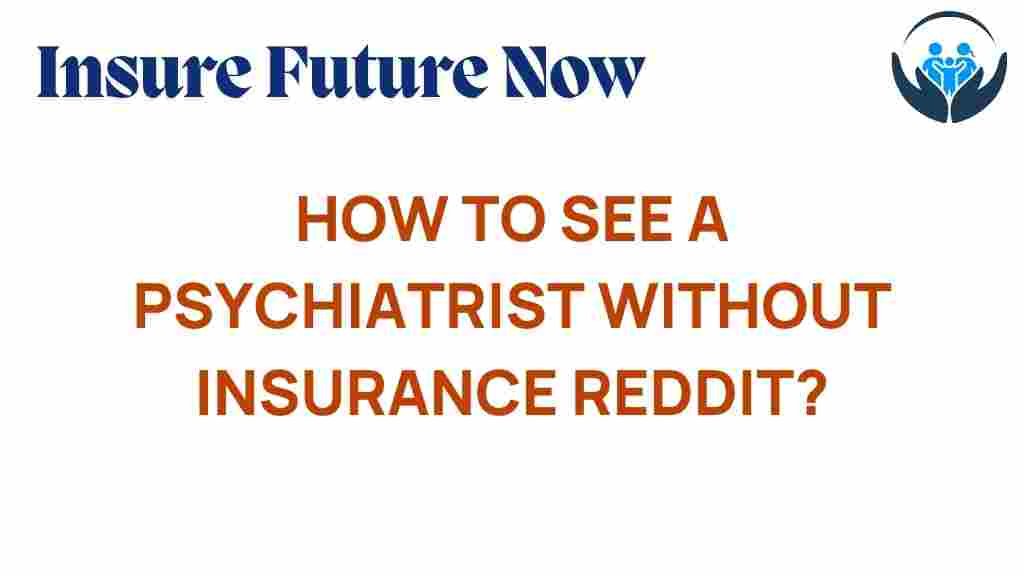Navigating Mental Health Care: Seeing a Psychiatrist Without Insurance
Accessing mental health care is crucial for maintaining well-being, but navigating this landscape can be particularly challenging when you find yourself without insurance. Many individuals may feel overwhelmed or unsure of their options, especially when it comes to seeing a psychiatrist. Fortunately, there are various avenues for affordable care and support that can help you access the therapy options you need. In this article, we will explore how to find a psychiatrist, the options available for those with no insurance, and resources that can support your mental health journey.
Understanding the Role of a Psychiatrist
A psychiatrist is a medical doctor specializing in mental health. They can diagnose and treat mental illnesses, prescribe medication, and offer therapy. Understanding their role can help you feel more comfortable seeking help. Here are some key aspects of what a psychiatrist does:
- Evaluates mental health conditions through assessments and interviews.
- Prescribes medication when necessary.
- Provides therapy options, including cognitive behavioral therapy and more.
- Works collaboratively with other mental health professionals.
Finding the right psychiatrist is essential, especially when you are seeking care without insurance. Here’s how to navigate this process effectively.
Step-by-Step Process to See a Psychiatrist Without Insurance
1. Research and Identify Local Resources
Start by looking for community resources in your area. Many local health departments, non-profit organizations, and community health clinics offer mental health services at a reduced rate or on a sliding scale based on income. Here are a few resources you might consider:
- Community Mental Health Centers
- Federally Qualified Health Centers (FQHCs)
- Non-profit organizations focused on mental health
- University clinics that provide services by supervised students
2. Explore Online Consultations
Online consultations with psychiatrists have become increasingly popular and can be a cost-effective option. There are several platforms that allow you to consult with a psychiatrist from the comfort of your home. Some benefits of online consultations include:
- Lower costs compared to in-person visits.
- Flexibility in scheduling appointments.
- Access to a wider range of specialists.
Websites like BetterHelp and Talkspace provide affordable therapy options that may include psychiatrist consultations.
3. Look for Sliding Scale Payment Options
Many psychiatrists and mental health clinics offer sliding scale fees based on your income. This means you may pay less if you have a lower income. When contacting potential psychiatrists, ask if they have this option and provide your income details to see what you might qualify for.
4. Utilize Support Networks
Connecting with support networks can also provide guidance and additional resources for accessing mental health care. Here are ways to engage with support networks:
- Join local mental health advocacy groups.
- Participate in online forums or social media groups focused on mental health.
- Attend community events or workshops related to mental wellness.
5. Consider Group Therapy Options
Group therapy can be a more affordable way to receive mental health support while also learning from others’ experiences. Many therapists offer group sessions at reduced rates. This can be a beneficial supplement to individual therapy with a psychiatrist.
Troubleshooting Common Challenges
When seeking a psychiatrist without insurance, you may encounter several challenges. Here are some common issues and tips for overcoming them:
Finding a Psychiatrist Who Accepts No Insurance
It can be difficult to find psychiatrists willing to work with clients without insurance. Here are some tips to improve your search:
- Use online directories that filter by payment options, such as Psychology Today.
- Contact local mental health organizations for referrals.
- Ask about telehealth options, which may have different payment structures.
High Costs of Medication
Medications prescribed by psychiatrists can be expensive, particularly without insurance. To manage this:
- Ask your psychiatrist about generic medication options.
- Inquire about patient assistance programs offered by pharmaceutical companies.
- Look into discount prescription programs available at local pharmacies.
Dealing with Stigma
Many individuals feel stigma around seeking mental health care. Remember that prioritizing your mental health is crucial and that seeking help is a sign of strength. Here are ways to combat stigma:
- Educate yourself and others about mental health issues.
- Share your experiences with trusted friends or support networks.
- Engage in open conversations about mental health in your community.
Conclusion: Taking the First Step Towards Mental Health Care
Navigating mental health care without insurance can seem daunting, but there are numerous resources and options available to ensure you get the help you need. By researching local resources, considering online consultations, and utilizing community support networks, you can access affordable care. Remember to explore all therapy options and be open to group therapy or sliding scale fees to make the process more manageable.
Prioritizing your mental health is an important step towards leading a fulfilling life. If you or someone you know is struggling, don’t hesitate to reach out for help. The journey to mental wellness is a path worth taking, and support is available every step of the way.
This article is in the category Tips and created by InsureFutureNow Team
